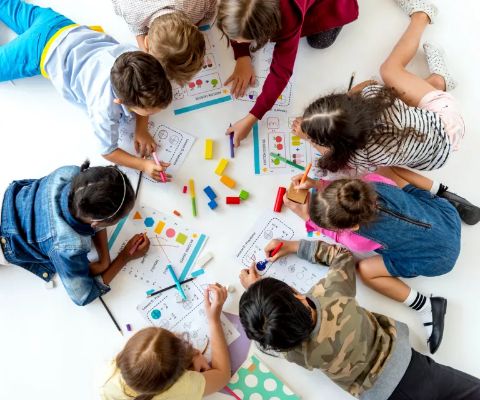Seemingly overnight, a new learning vocabulary has invaded the popular lexicon, bringing terms like homeschooling, unschooling, road schooling, remote learning, distance learning, and virtual learning into the spotlight.
The way we educate our children has changed dramatically in recent times. Before March 2020, most people only commonly used words like homeschooling, unschooling, and virtual learning. But then something unexpected happened: a global pandemic. Because of this, many schools had to close temporarily, and more than 55 million students in the United States found themselves learning from home. However, what they experienced was different from traditional homeschooling.
Traditional homeschooling involves field trips, group classes, and being part of the community, but these things were not possible during this challenging time. Some experts have called this new learning method “crisis schooling” because it responded to an unexpected crisis.
What Is Unschooling?
Unschooling is an educational approach that embraces learners’ inherent curiosity and autonomy. By following their passions, engaging in real-world experiences, and taking charge of their education, unschoolers develop a love for learning far beyond the traditional classroom setting.
Unschooling is rooted in the belief that children are naturally inclined to learn and explore the world around them. It acknowledges that each individual has unique interests, talents, and learning styles and seeks to foster a love for learning by empowering the learner to take charge of their education. The core principles of unschooling include self-directed learning, autonomy, and respect for the child’s innate curiosity.
What Is Homeschooling? – Tailoring Education for Individualized Learning
Homeschooling involves parents or guardians taking on the role of primary educators, providing instruction and guiding their children’s learning. It offers an opportunity to create a customized curriculum tailored to the child’s interests, learning style, and academic goals. Homeschooling can be structured, following a set curriculum or educational program, or more flexible, allowing for a more eclectic and individualized approach.
Parental Guidance and Instruction

In Homeschooling, parents or guardians actively guide and instruct their children. They act as facilitators, providing explanations, demonstrations, and one-on-one support to help their children grasp concepts and acquire knowledge.
Academic Accountability and Assessment
Homeschooling parents are responsible for monitoring their children’s progress and assessing their academic achievements. This can be done through various means, such as regular assessments, portfolios of work, standardized testing, or evaluations by qualified professionals.
Socialization Opportunities

One common concern about Homeschooling is the potential lack of social interaction and opportunities for children to develop social skills. However, homeschooling families often actively seek socialization opportunities, such as joining homeschooling co-ops, participating in community activities, sports, and clubs, and engaging with other homeschooling families. These interactions provide a well-rounded social environment for homeschooled children.
Homeschooling Challenges and Concerns
Homeschooling is not without challenges. It requires significant commitment, time, and dedication from parents or guardians who take on the role of educators. Balancing teaching responsibilities with other commitments can be demanding. Additionally, some families may face legal and regulatory requirements, varying by jurisdiction, and potential skepticism or misunderstanding from society regarding the effectiveness and quality of Homeschooling.
Considerations for Choosing Between Unschooling and Homeschooling – Unschooling vs Homeschooling
When deciding between unschooling and homeschooling, there are several factors to consider. Here are some key considerations to help you make an informed decision:
| Considerations | Unschooling | Homeschooling |
| Philosophy | Emphasizes self-directed learning | Can follow a structured curriculum or program |
| Learning Style | Child-led exploration and interests | May provide a structured and guided approach |
| Parental Involvement | High level of parental involvement | Involvement varies based on chosen approach |
| Flexibility vs. Structure | Maximum flexibility and organic learning | Offers structure and routine through curriculum |
| Available Resources | Relies on real-world experiences and community resources | Utilizes libraries, online resources, co-ops |
| Legal Requirements | Compliance with local regulations and documentation | Compliance with local regulations and reporting |
Key Differences Between Unschooling and Homeschooling
Both approaches have distinct features and cater to different educational philosophies and preferences. Choose the one that best aligns with your family’s values, educational goals, and your child’s needs.
| Key Differences | Unschooling | Homeschooling |
| Approach | Child-led and self-directed learning | Structured and guided learning |
| Curriculum | No set curriculum or formal lesson plans | May follow a specific curriculum or program |
| Learning Style | Emphasizes individual interests and passions | Can adapt to various learning styles |
| Flexibility | Offers maximum flexibility and freedom | Can provide flexibility based on chosen approach |
| Parental Involvement | High level of parental involvement | Involvement varies based on chosen approach |
| Socialization | Relies on real-world experiences and community interactions | Can involve socialization through activities and co-ops |
| Assessment | No standardized testing or grading | Can include assessments, portfolios, or testing |
| Legal Requirements | Compliance with local regulations and documentation | Compliance with local regulations and reporting |
Meet Sandra Dodd – The Guiding Light of Unschooling

Sandra Dodd, a prominent advocate for unschooling, supports families worldwide. Her practical ideas on parenting and natural learning resonate deeply with parents seeking respectful approaches. Sandra has unschooled her three children and authored two books. She shares her wisdom on her website, speaks at conferences, and conducts workshops internationally.
In this interview, we discuss key aspects of unschooling, addressing parents’ doubts and fears about homeschooling. Join us for an insightful conversation with Sandra Dodd, a guiding light in unschooling.
Unschooling Insights – A Conversation with Sandra Dodd
Rashmi: Hi Sandra, I’ve heard much about unschooling and its benefits. Can you share your experience with unschooling your children?
Sandra: Certainly! Unschooling has been a remarkable journey for our family. One of the most rewarding aspects has been witnessing our children learn and grow in a peaceful environment. We wanted them to be free to explore their interests and develop at their own pace, free from the constraints of traditional schooling.
Rashmi: Many people raise concerns about socialization regarding homeschooling or unschooling. What are your thoughts on this?
Sandra: The notion of “socialization” in traditional schools can often be restrictive and harmful. Unschooled children have ample opportunities to interact with people of different ages and engage in real-world activities. They learn how to communicate effectively and build relationships based on genuine connections rather than just interacting with a limited group of peers their age.
Rashmi: Critics argue that the collaborative nature of school settings fosters skills like sharing, teamwork, and leadership. How does unschooling address these concerns?
Sandra: While schools may promote collaboration, they often overlook the negative aspects, such as bullying and exclusion, that can occur within peer groups. Unschooling, on the other hand, encourages children to engage with individuals of various ages and backgrounds. This exposure allows them to develop valuable social skills naturally as they interact with a diverse range of people in real-life situations.
Rashmi: How has unschooling impacted your family life beyond academics?
Sandra: Unschooling has had a profound effect on our family dynamics. It has allowed us to form deep, loving relationships with our children, free from predefined roles and expectations. We truly know and understand each other on a personal level. This shift in perspective spills over into our social interactions, where we engage with others based on genuine connection and interest.
Rashmi: Have your children pursued higher education or chosen different paths?
Sandra: Yes, they have taken different paths. My son Kirby found success in the gaming industry, working for a renowned company. Marty has explored various job opportunities, such as making leather products and studying math and economics. Holly has engaged in retail, childcare, and her interests, like yoga and art.
Rashmi: It’s fascinating to see how your children have flourished outside the traditional education system. In a nutshell, what would you say is the essence of unschooling?
Sandra: Unschooling fosters a nurturing environment where children can learn and grow organically, pursuing their passions and interests at their own pace. It emphasizes meaningful connections, genuine relationships, and a holistic approach to education that extends beyond academics.
Rashmi: Thank you, Sandra, for sharing your insights and experiences. Your perspective on unschooling provides a valuable understanding of this alternative approach to education.
Sandra: You’re welcome, Rashmie. It was a pleasure discussing unschooling with you, and I hope our conversation helps others understand its essence and potential benefits.
Conclusion
Choosing between unschooling and homeschooling depends on your educational philosophy, your child’s learning style, and the level of structure and parental involvement you desire. Unschooling emphasizes self-directed learning and flexibility, while homeschooling offers structure and adaptability. Consider your family’s values and goals to make an informed decision that best suits your child’s unique needs and fosters a love for learning.
